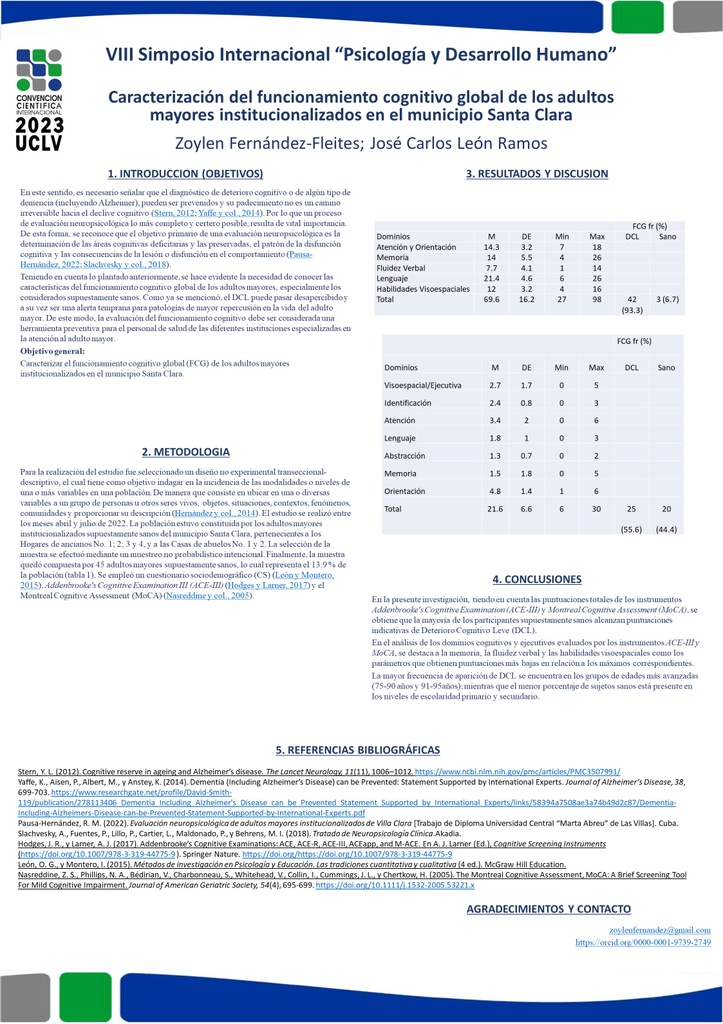Executive Secretary

8th International Symposium "Psychology and Human Development" 2023

Introduction: The diagnosis of cognitive impairment can be prevented and its suffering is not an irreversible path towards cognitive decline. In this sense, it is known that there are differences in cognitive functioning between non-institutionalized and institutionalized elderly. Therefore, its evaluation should be considered a preventive tool to be used in the different institutions specialized in the care of the elderly.
Objective: To characterize the global cognitive functioning of institutionalized older adults in the Santa Clara municipality.
Methodology: A non-experimental cross-sectional-descriptive study was carried out between April and July 2022. The sample consisted of 45 older adults. The instruments used were the Addenbrooke's Cognitive Examination III (ACE-III) to assess global cognition, and the Montreal Cognitive Assessment (MoCA) to detect Mild Cognitive Impairment (MCI) indices. The data obtained were processed through descriptive statistics, specifically frequency analysis.
Results: In the sample, a MCI frequency of 93.3% was obtained according to the results obtained in the ACE-III and 55.6% according to the MoCA. Based on the results obtained by both instruments, memory, verbal fluency and visuospatial skills stood out as the most affected domains. Similarly, in both instruments the highest frequency of MCI was found in the oldest age groups and the lowest percentage of healthy subjects in the lowest levels of education.
Conclusions: In the present investigation, most of the supposedly healthy participants obtained scores indicative of MCI.
Introducción: El diagnóstico de deterioro cognitivo puede ser prevenido y su padecimiento no es un camino irreversible hacia el declive cognitivo. En este sentido, se conoce que existen diferencias en el funcionamiento cognitivo entre ancianos no institucionalizados e institucionalizados. Por lo que su evaluación debe considerarse una herramienta preventiva a utilizar en las diferentes instituciones especializadas en la atención al adulto mayor.
Objetivo: Caracterizar el funcionamiento cognitivo global de los adultos mayores institucionalizados en el municipio Santa Clara.
Metodología: Se realizó un estudio no experimental tanseccional-descriptivo entre abril y julio del 2022. La muestra quedó conformada por 45 adultos mayores. Los instrumentos utilizados fueron el Addenbrooke's Cognitive Examination III (ACE-III) para evaluar la cognición global, y el Montreal Cognitive Assessment (MoCA) para detectar índices de Deterioro Cognitivo Leve (DCL). Los datos obtenidos se procesaron mediante la estadística descriptiva, específicamente análisis de frecuencia.
Resultados: En la muestra se obtuvo una frecuencia de DCL de 93.3% de acuerdo a los resultados obtenidos en el ACE-III y de 55.6% según el MoCA. En función de los resultados obtenidos por ambos instrumentos, se destacaron la memoria, la fluidez verbal y las habilidades visoespaciales como los dominios más afectados. De igual manera, en ambos instrumentos la mayor frecuencia de DCL se encontró en los grupos de edades más avanzadas y el menor porcentaje de sujetos sanos en los niveles de escolaridad más bajos.
Conclusiones: En la presente investigación, la mayoría de los participantes supuestamente sanos, obtuvieron puntuaciones indicativas de DCL.
About The Speaker

Prof. Zoylen Fernández-Fleites

Discussion